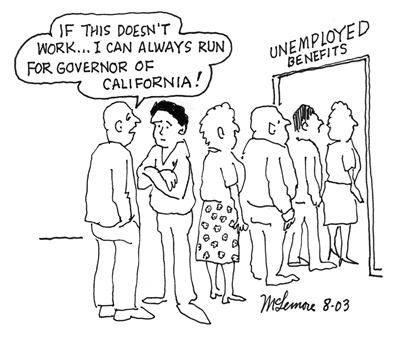|
 HOT ISSUE HOT ISSUE
Globalization keeps
hitting home
By
Andy Brack
SC Statehouse Report
| |
|
FEEDBACK
POLICY
We encourage
your feedback. If you'd like to respond to something in SC
Statehouse Report, please send us an e-mail. We reserve
the right to edit for length and clarity. One submission allowed
per month. Please keep your comment to 250 words or less:
|
AUG. 24, 2003 - - American manufacturers are living on borrowed
time unless they make changes.
That's the lesson offered by huge Hartsville manufacturer Sonoco,
which this week took steps to streamline $60 million in operating
costs with layoffs of 130 professionals in its Pee Dee headquarters
and 210 others in its 300 plants in 32 countries around the world.
By the time the global packaging company is done with its cost-cutting
measures at the end of next year, it will have cut 2,000 jobs and
closed 20 plants worldwide, company official say.
That almost matches the 18 plants and $60 million in costs the
company has cut since a global recession started three years ago,
said company vice president Allan Cecil.
Both sets of streamlining measures take into account a changing
global marketplace where customer loyalty is diminishing and low-cost
is the business king. South Carolina businesses should take heed,
just as Sonoco has, Cecil said.
"They've got to basically come to an understanding of what's
going to be required to continue to compete," he said. "You
must be a low-cost producer. There are just not going to be any
options if you're not a low-cost producer - - maybe not the lowest,
but among the lowest-cost producers."
If manufacturers don't take appropriate steps to remain competitive
- - even with American productivity at the highest of any country
in the world - - U.S. manufacturing will continue to wither. Witness
the thousands of textile jobs that have left South Carolina for
China, Mexico and other countries. Look in virtually every manufacturing
industry - - cars, shoes, electronics - - at the stories of companies
shutting down in America and moving overseas.
"For a long time, we kidded ourselves in terms of our quality
by thinking no one else can produce goods of the same quality as
we can," Cecil said.
But today if you go to China, the biggest manufacturing threat
to the U.S., you'll find state-of-the-art plants with high-quality
infrastructure that soon, if not already, will be as productive
and focused on quality as American plants, Cecil says. Because manufacturers
can pay far less in wages and benefits in overseas countries like
China, they can produce goods more cheaply, which puts more stress
on American manufacturers.
"They can produce anything that we can basically, but give
them a little time and they'll produce it at the same quality,"
Cecil said.
If you don't believe it, look at the bottom of almost anything
bought at a superstore these days. More than likely, it was made
outside of the United States.
The U.S. trade deficit, now at $485 billion a year, reflects how
we import more than we produce. Just six years ago, the trade deficit
was $191 billion. According to a recent Newsweek article, Americans
import $1.79 worth of goods for every $1 of goods they produce.
With these numbers, it's easy to see why the manufacturing heart
and soul of the country is moving overseas.
In addition, the global forces - - labor costs, benefits, energy
costs - - which cause manufacturers to emphasize low production
costs don't appear to be abating. Sonoco, which makes paper, textile,
tape, film and metal packaging products for other manufacturing
industries, believes the sector will look vastly different when
the current recession ends.
"We're a pretty good leading edge indicator on the manufacturing
side," Cecil said. "We're not seeing any improvement in
demand - - now, it isn't getting worse, but it's not significantly
improving."
When things do get better, it's likely "a much larger percentage
of the goods they (American industries) require will be produced
offshore."
Cecil said the company, now ranked 520 on the Fortune 1000 list
of America's top companies, was continuing efficiency measures now
to protect its long-term viability and health.
"What we're trying to ensure is we'll continue to have that
same strength," he said. "We can't wait until it gets
to the point it becomes crystal clear (what will happen) because
it then will be too late."
 McLEMORE'S WORLD McLEMORE'S WORLD
A different kind of employment
This week's cartoon effort by our Bill McLemore:

###
|





